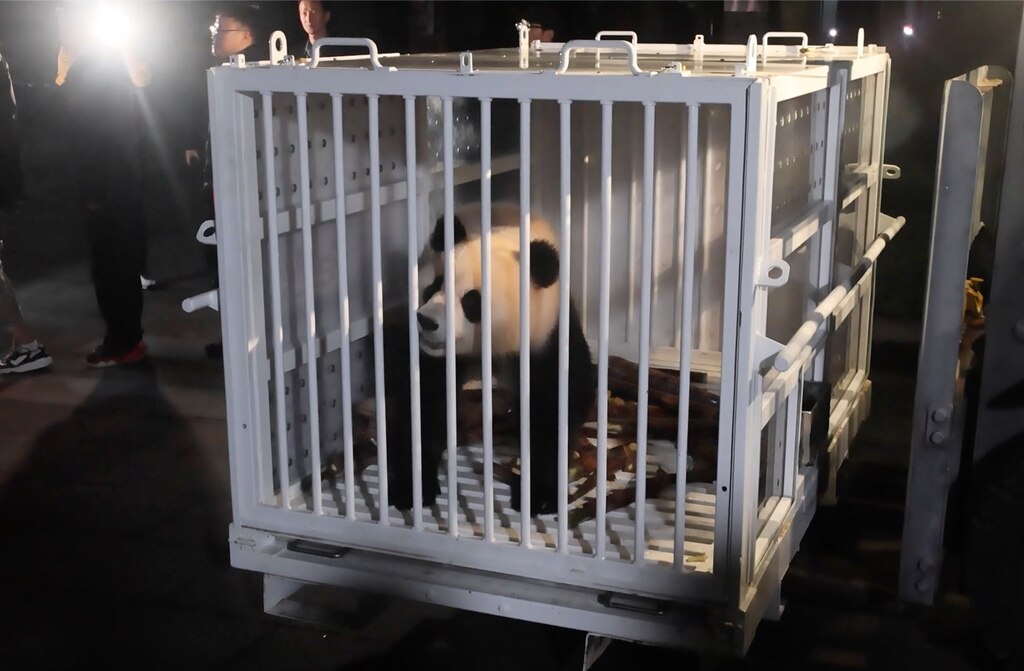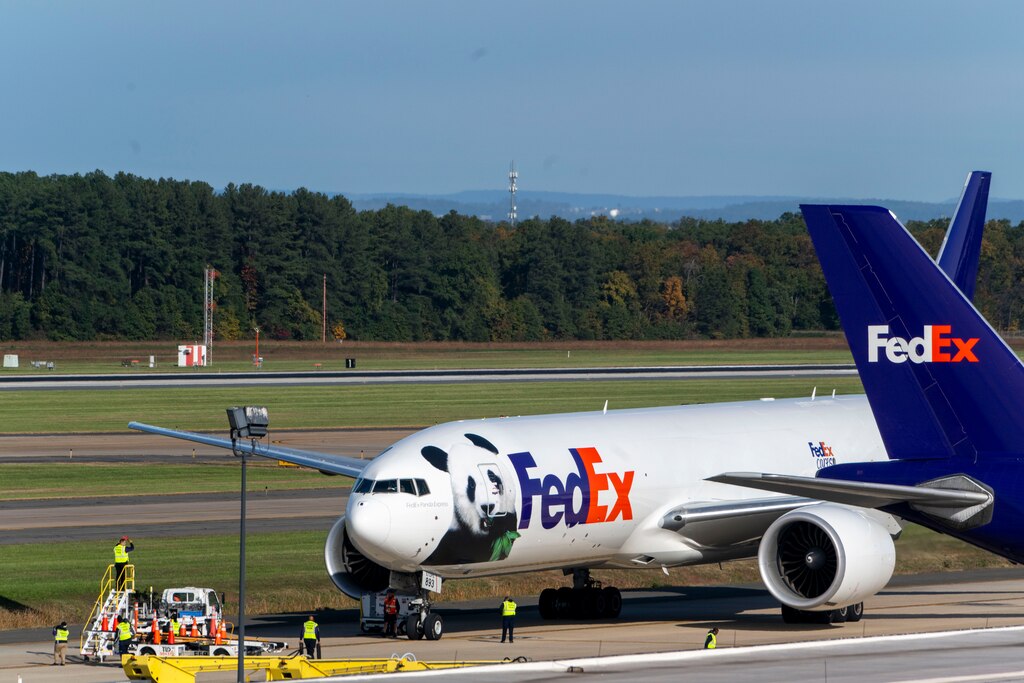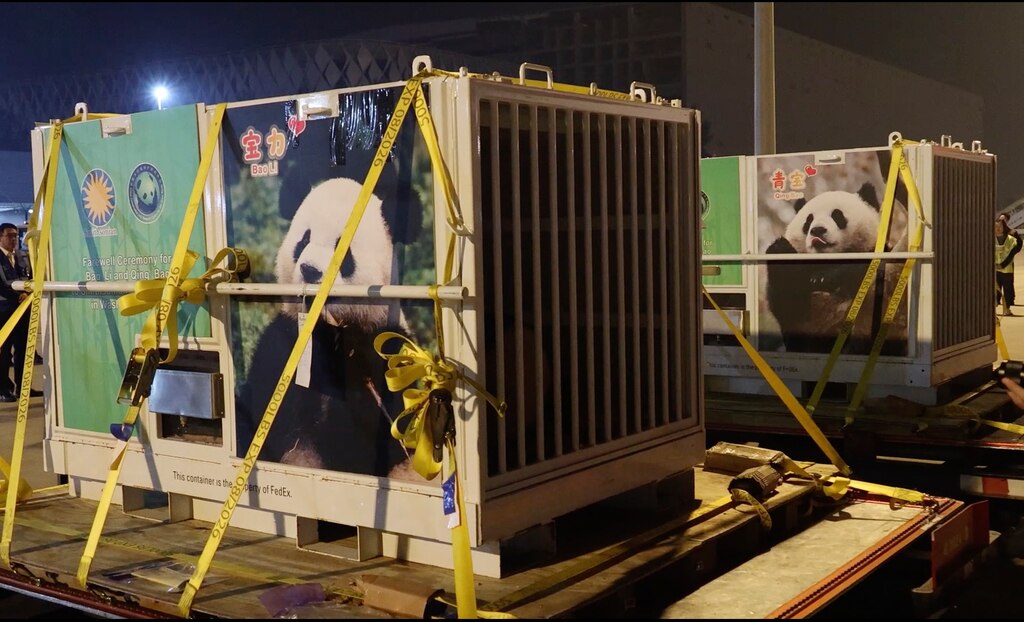WASHINGTON — The National Zoo’s long dark panda drought has come to an end.
Eleven months after the zoo sent its three wildly popular pandas — Mei Xiang, Tian Tian and their cub Xiao Qi Ji — back to China, a new pair of bears arrived late Tuesday morning.
The 3-year old giant pandas, named Bao Li and Qing Bao, were flown from China to Dulles International Airport in suburban Virginia, with a refueling stop in Alaska. They were loaded into special FedEx trucks and arrived at the zoo just before noon.
“Our team has worked tirelessly to prepare for the pandas’ arrival, and we’re thrilled to welcome Bao Li and Qing Bao to Washington, D.C., the only place you can see giant pandas for free in the nation,” said Brandie Smith, the National Zoo director who traveled to China to take part in farewell ceremonies for the bears there. “As a result of our collective efforts, today we joyfully celebrate a new chapter of our 52-year-long giant panda breeding and conservation program.”
The Baltimore Banner thanks its sponsors. Become one.

The zoo was closed Tuesday to facilitate the arrivals. The bears will be quarantined from the public for at least 30 days. A statement from the zoo set the date for the bears’ official public debut and the reopening of the renovated panda house as Jan. 24, 2025.
Orioles owner David Rubenstein retweeted the National Zoo’s announcement Monday that something “giant” was coming to the nation’s capital.
Read More
Rubenstein has given $22 million to the D.C. zoo’s panda conservation program, including $10 million just last month.
The giant panda complex was named the David M. Rubenstein Family Giant Panda Habitat after he donated $4.5 million in December 2011, funding the giant panda program through 2016.
Bao Li (precious vigor) and Qing Bao (green treasure) arrive in Washington as part of a new 10-year agreement with Chinese authorities. The previous deal expired last year, leading to some concern among American panda-lovers that Beijing was gradually pulling its furry friendship ambassadors from American zoos amid rising diplomatic tensions.
The Baltimore Banner thanks its sponsors. Become one.
Breeding pairs in zoos in Memphis and San Diego had already returned to China earlier and the four pandas in the Atlanta zoo left for China last week.
That anxiety turned to optimism last November when Chinese President Xi Jinping publicly stated a desire to continue the panda exchange programs. This year, a new pair of bears has been delivered to the San Diego Zoo, while another pair has been promised to San Francisco.
In Washington, National Zoo officials remained conspicuously silent about negotiations for a new panda agreement, but they expressed optimism about striking a new deal and launched a multimillion-dollar renovation of its panda enclosure in anticipation. Then in late May, Smith teamed up with first lady Jill Biden to announce that Bao Li and Qing Bao would be arriving by the end of this year.

Pandas have become one of the unofficial symbols of the nation’s capital, dating back to 1972 when the first pair — Ling Ling and Hsing Hsing — were sent as a gift from Chinese Premier Zhou Enlai following President Richard Nixon’s historic diplomatic visit to China. Later, a rolling series of 10-year cooperation agreements was struck.
“The giant pandas are an iconic part of the Washington, D.C., story, both for locals and incoming travelers alike,” said Elliott L. Ferguson, II, president and CEO of Destination DC. “The interest and excitement associated with their return directly benefits the entire city, bringing further interest and visitors to our hotels, restaurants and other attractions.”
The Baltimore Banner thanks its sponsors. Become one.
The exact terms of the deal are still unclear; under previous 10-year agreements the Chinese government receives $1 million per year, per bear. Any cubs born in overseas zoos are typically returned to China before they reach age 4.
Liu Pengyu, a spokesperson for the Chinese embassy in Washington, credited the decades of cooperation with advancing research into panda preservation and breeding. During the lifespan of these agreements, giant pandas have been reclassified from an endangered species to merely vulnerable.
“The current round of cooperation will focus on prevention and treatment of major diseases, and protection of habitats and wild giant panda populations,” Liu said in an email. “We hope the arrival of the pandas will inject fresh impetus into exchanges between China and the U.S., and help to stabilize the broader bilateral relationship as well.”





Comments
Welcome to The Banner's subscriber-only commenting community. Please review our community guidelines.